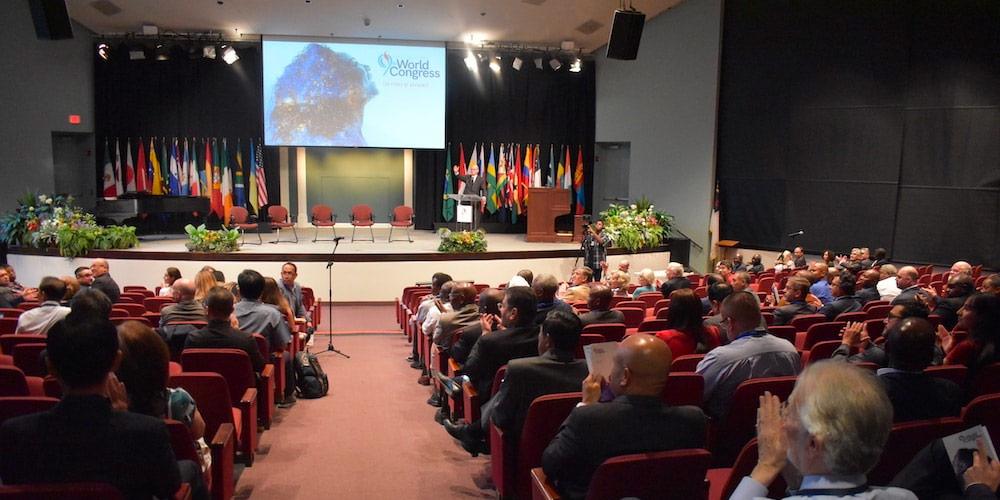
Religious Liberty Event Pays Tribute to 130 Years of Advocacy
By Marcos Paseggi, Adventist Review
Nearly 150 religious liberty leaders, scholars, and advocates from around the world met for the 9th World Congress of the International Religious Liberty Association (IRLA) in Silver Spring, Maryland, United States, August 21-23.
The international event invited attendees to discuss “a wholistic understanding of freedom of religion or belief as a pivotal human right,” organizers said.
In his remarks on August 21, Ted N. C. Wilson, president of the General Conference of Seventh-day Adventists, welcomed attendees, reminding them of the historical focus of the denomination on the topic.
“Adventist pioneers … saw in religious liberty an incontrovertible value without which our very humanity could be at risk of being diminished and impaired,” thus embracing “the priceless value of religious freedom, and the foundation of freedom itself,” Wilson said.
Wilson shared how Adventist pioneers fought against oppression of others, against slavery, and against early attempts at Sunday laws. “Adventist leaders officially adopted a solidarity with the whole human family through the advocacy of religious liberty,” he reminded attendees.
Do We Really Believe It?
The opening program included words by IRLA’s president, Ambassador John Nay, who reflected on the implications of supporting religious liberty. “We say we believe in religious freedom for all people,” he said. “But do we really believe it in our hearts?” Nay called his audience to move past supporting religious freedom just for their own group, religious or otherwise, and embrace an advocacy that takes every human being into account.
At the same time, Nay emphasized, accepting religious freedom for all people — for those who believe and for those who don’t believe — may lead us to question our behaviors toward other groups. He explained that while we are within our rights to question a law for purely secular reasons, we should be very careful when using religious arguments to oppose a particular bill.
“The question is, to what extent is permissible, even equitable, to limit other people’s civil rights based on our religious views?” he said. “I suggest it is inconsistent, and some would even say hypocritical, to advocate for religious liberty but oppose granting rights and freedoms to others who are not believers and using religious reasons for taking that stand.”
A Moral Imperative
After Nay’s presentation, IRLA secretary general Ganoune Diop discussed a comprehensive faith-based understanding of religious freedom, which he defined as “the right to profess, practice, and propagate one’s beliefs without coercion, intimidation, or manipulation.” Religious freedom is “freedom from being forced to do something that is against one’s deeply held convictions or against one’s conscience,” Diop said. “[It] is a centerpiece which occupies a pivotal position among freedom and rights.”
Diop emphasized that the creation of the IRLA 130 years ago “is connected to the conviction that religious freedom is a moral imperative” which “is part of God’s image in humans.” He emphasized, “Freedom is constitutive to who we are meant to be. Without freedom, we are incomplete.… [And] the determination to spread the awareness of freedom of thought, conscience, and belief is necessary to what it means to be a human being.”
An Ongoing Enterprise
The keynote speaker for the opening program was His Excellency Adama Dieng, former U.N. under-secretary general and special adviser of the U.N. secretary general on the prevention of genocide, discussed a wholistic understanding of religious freedom in an increasingly polarized world. Dieng, who took part in the trials of the leaders responsible for the Rwandan genocide, reminded attendees of all that has been accomplished in the field of human rights and specifically religious freedom.
At the same time, Dieng pointed out all the challenges that remain to tackle ongoing violations to the dignity of people around the world. “Unfortunately, these rights [to religious freedom] are constantly violated by state and non-state actors,” he acknowledged, citing contemporary examples in several places in the world. He then called for action to face the ongoing challenges.
Dieng added, however, that intolerance and discrimination “cannot simply be prevented or eliminated by strategic measures alone. Reflection and elimination of intolerance based on attitudes and practices requires ongoing education and interfaith dialogue,” he said.
Other keynote speakers during the event included Ambassador Sam Brownback, former U.S. ambassador-at-large for International Religious Freedom, and Knox Thames, former special adviser for religious minorities at the U.S. State Department.
Breakout sessions invited attendees to reflect on the history, current challenges, and opportunities for religious freedom advocates. It included discussions on religious nationalism, attitudes to religious minorities, and ideas for action. Attendees will also participate in a visit to the U.S. National Archives in Washington, D.C., and a closing banquet and award ceremony at a venue close to the White House.
About the IRLA
The IRLA was founded in 1893 by a group of Seventh-day Adventists who were concerned about religious persecution and discrimination. The organization was created to advocate for the religious freedom of all people, regardless of their faith and background. “The IRLA addresses religious freedom issues and provides support and resources to individuals and communities facing persecution,” organization leaders said. “[It also] fosters dialogue and cooperation among people of various faiths and philosophical persuasions.”
The article was updated on August 28, 2023.